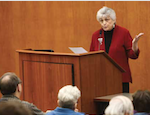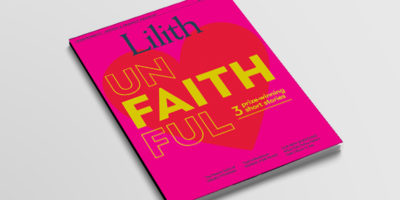
Halakhah and the Challenge of #MeToo: The World Split Open
“What would happen if one woman told the truth about her life? The world would split open.”— Muriel Rukeyser
How do we go about repairing halakhic systems and communities that embody some of the most destructive halakhic attitudes? I would propose a four-step process:
STEP 1 Listening: Just as God hears the Tza’akah, or outcry, of the oppressed, the ignored, the disvalued, God’s halakhah and those who receive it must begin to hear the anguished narratives of those who cry out — even when its traditional ground rules predispose it to discount their testimony. True listening acknowledges the full personhood of those who tell their stories.
STEP 2 Re-categorizing: This process requires reevaluating problems and injuries known to the tradition and including the perspectives of those who were injured. As for injuries of the tradition was oblivious or that have only recently become possible, such as cyber-stalking or cyber harassment, we will have to search for or invent categories that properly acknowledge and describe them.
STEP 3 Finding remedies and urging accountability: Obviously, some remedies and some forms of accountability are the responsibility of the secular justice system, but both the re-making and enforcement of ethics codes and the identification and amelioration of gender discrimination in Jewish institutions are very much our business. The Reform movement has been doing major research on pay inequity for reasons of gender. The whole of the previous issue of The Reform Jewish Quarterly deals with this research and its implications. Policy changes will follow. Jewish institutions of all kinds need to assume accountability for gender discrimination and aggression by members, staff, or population served. One remedial option is restorative justice programs, which focus on the rehabilitation of offenders through face-to-face encounters with victims and representatives of the community. When an offender recognizes whom he has hurt and how, specifically and pursues te’shuvah with the injured parties, the reconciliation that follows is healing for all the participants. Research seems to indicate that offenders who complete such a program are significantly less likely to repeat the offense.
STEP 4 Re-educating committed Jews to practice gender justice: This project will take centuries. It would be countercultural; that is it would resist and critique cultural assumptions, images, narratives, and values. We would have to begin with early childhood education and go on resisting through all the stages of maturation. Currently, Jewish institutions of learning have a secular legal mandate to educate faculty, staff, and boards about responsibilities under Title IX legislation. That opportunity could be used to teach also Jewish texts, language, and law about our constantly evolving obligations to respect human dignity, to treat everyone justly, and to be vigilant about deception/ona’ah, and the grave infraction of ona’at d’varim, wounding with words. Jewish philanthropic organizations must educate themselves as well. Ugly and notorious cases of sexual harassment have to cease. Synagogues can also teach their boards, their members, and their students to respect each other’s boundaries and those of the staff.
Perhaps there will come a time when we honor people for their learning, their compassion, their generosity, but do not privilege any gender or sexual orientation and do not reject any. I doubt I’ll be here to see the day when sexual harassment and discrimination and disparagement on the basis of gender cease to be routine, the day that women’s stories inform Jewish law and texts as men’s do, the day injustice melts away like smoke, but I will work and hope for it the rest of my life — the day the world splits open.
RACHEL ADLER is a feminist theologian and ethicist. This piece is from the conclusion to her lecture on “#MeToo and Jewish Law,” this year’s Robbins Collection Annual Lecture in Jewish Law, Thought and Identity in February.


